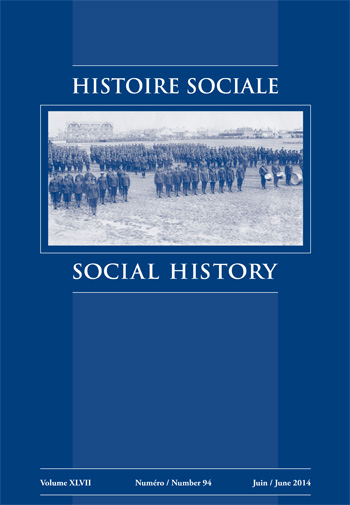A War Within a War: Canadian Reactions to D. W. Griffith’s The Birth of a Nation
DOI :
https://doi.org/10.1353/his.2014.0041Résumé
D. W. Griffith’s wildly successful epic film was released in Canada, a nation at war, in 1915. Based on the novel and play The Clansman by Thomas Dixon, the motion picture popularized a pro-Southern view of the Civil War and Reconstruction era that demonized African Americans and abolitionists and made heroes of the first Ku Klux Klan. This paper examines Canadian responses to the film in 1915 and 1916, paying particular attention to protests by African Canadians, which usually were organized through church congregations. The Birth of a Nation was a challenge for provincial film censors in a nation that supposedly frowned on American traditions of violence and supported British “fair play.” During wartime, African Canadians appealed to citizenship, patriotism, and Britishness to mount an early, if largely unsuccessful, civil rights struggle against an invading American cultural product.
L’extraordinairement populaire film épique de D.W. Griffith est sorti au Canada en 1915, pendant la guerre. Basé sur le roman et la pièce de théâtre The Clansman de Thomas Dixon, le film adoptait un point de vue pro-sudiste sur la Guerre civile et la période de la reconstruction qui diabolisait les Afro-Américains et les abolitionnistes et encensait le Ku Klux Klan. Le présent article se penche sur les réactions à ce film au Canada en 1915 et en 1916, notamment sur les manifestations organisées par les Afro-Canadiens, généralement sous l’égide de congrégations religieuses. The Birth of a Nation s’est avéré un casse-tête pour les bureaux provinciaux de censure dans un pays supposément réfractaire à la culture de la violence américaine et favorable au « fair-play » britannique. Au cours de la guerre, les Afro-Canadiens ont fait appel aux sens de la citoyenneté, du patriotisme et de l’esprit britannique pour organiser une lutte rapide, quoique vaine, en faveur des droits civiques et à l’encontre d’un produit culturel américain envahissant.


